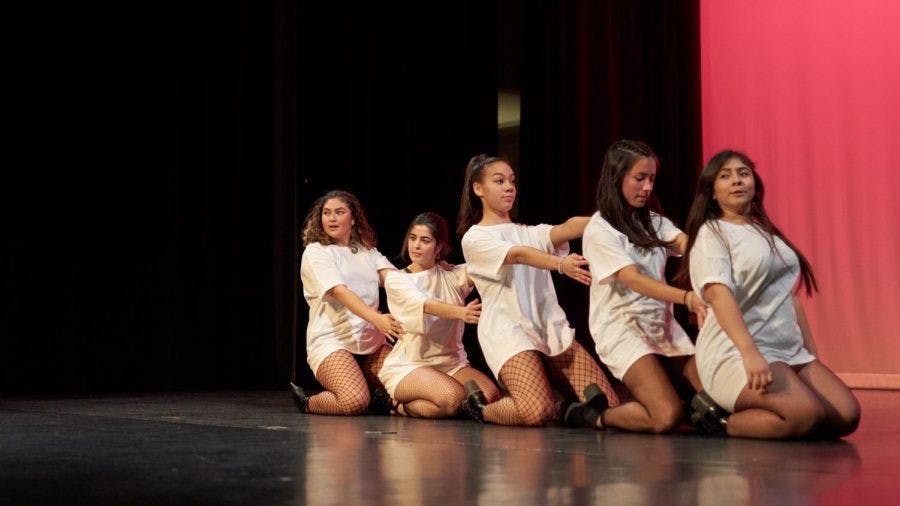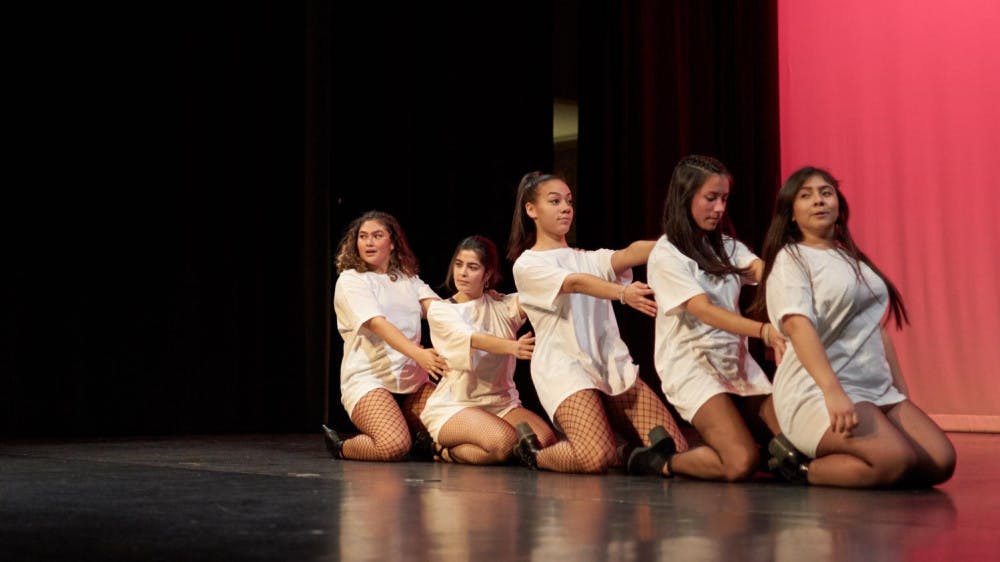RIDDIM World Dance Troupe, one of the college’s oldest and most recognizable student dance groups, takes Wilson Hall by storm twice a year. Its biannual show consistently sells out, and its recent Fall 2019 show, “RIDDIM Throws It Back,” was no different. Nearly every seat was filled as members of the audition-only troupe performed a variety of pieces choreographed by fellow dancers.
So, what’s RIDDIM all about?
RIDDIM began as RIDDIM World Dance Club in Spring 1998. Started by Tessa Waddell ’02, the club aimed to present the Middlebury community with different styles of dance. From the club came the troupe, an audition-only and student-run group with a stated goal “to provide the Middlebury College community with an outlet of expression through diverse dance styles.”
The word “riddim” comes from the Jamaican Patois pronunciation of the English word “rhythm,” but in reggae and other Afro-Carribean music styles it most commonly refers to the instrumental background of songs.
Mariel Edokwe ’20, a RIDDIM board member, said that the troupe’s style of dance has shifted away from its Afro-Carribean origin over the years.
“As [RIDDIM] continued on, it started kind of shifting towards a contemporary, modern, more ballet-based [style],” Edokwe said. “I know that there’s controversy about that, but I know that since I’ve joined RIDDIM, freshman year in the fall of 2016, they’re really trying to diversify in terms of its members and in terms of its dance styles.”
Edokwe said that the group aims to create a positive, open space for students to dance on campus. She recalled her own experience as a ballet dancer before coming to Middlebury and noted that many dancers in her position choose to pursue their career instead of an education. On-campus groups like RIDDIM allow students who want to dance to do both.
With that being said, RIDDIM members come with varying levels of dance experience. Some members come from a competitive background and have several years of ballet experience whereas others have no formal dance training at all. The troupe remains open to all styles of dance, which Edokwe considers “part of the beauty of RIDDIM itself.”

Malia Armstrong ’22.5 and Katie Koch ’22.5 choreographed “Partition,” a piece that asserts femininity and female sexuality.
“I know that for me, personally, and for a bunch of my friends and the group members, that it’s been really awesome for us to come in as, for me, say, a ballet dancer, and then to try hip-hop, try Latin dancing, and to try styles I’ve never done before and just grow as a person and dancer, and just kind of expose yourself to all there is that’s out there in a way that maybe you didn’t get to before," she said.
Malia Armstrong ’22.5 acknowledged the challenges of being a student dancer but said she feels supported by the RIDDIM community.
“Being in Riddim has completely reignited my creativity and passion after feeling burnt out after years of dancing competitively and has created a supportive and healing space on campus," she said. "It reminded me why I love to dance and that is something I will always be grateful for.”
RIDDIM is an inclusive environment that is welcoming to students of all classes and levels of experience. The nine-person board includes members of different years, which allows multiple voices to be heard, and any RIDDIM member can choreograph a piece as early as their second show.
Armstrong and Katie Koch ’22.5 choreographed their first piece, “Partition” for the Fall 2019 show. The dance was performed to Beyonce’s Partition – a song that celebrates female sexuality – and featured excerpts from speeches by Chimamanda Ngozi Adichie, a renowned author and vocal feminist.
Armstrong said that she and Koch chose this song because it features a woman talking about sex and sexuality with strength and confidence, something that is often repressed in society. They overlaid Adichie’s speeches over the song in order to more concisely convey their message. The song ended with the phrase “I have chosen to no longer be apologetic for my femaleness and femininity,” which Armstrong said sums up the intention behind their piece as a whole.
“My favorite part of choreographing this piece was being able to collaborate with Katie doing something that is out of my comfort zone,” Armstrong wrote in an email to The Campus. “I had never choreographed a heels piece, so exploring different movements with Katie was challenging, but being able to create something together that meant a lot to us was really exciting.”
“When I joined RIDDIM, I thought I was just joining a dance group,” she said. “I had no idea that this group would become my second family. I am so grateful to have connected with such an incredible community of people, all bonded by our love of dance.”

Emmanuel Tamrat '22 is Digital Director.
He began working for The Campus as a photographer and online editor in the fall of 2018, and previously served as senior online editor.
An Environmental Policy major, Tamrat hails from London, GB but calls Alexandria, VA home. At Middlebury, he is involved in Rethinking Economics and works as a Democracy Intiatives Intern with the CCE.




